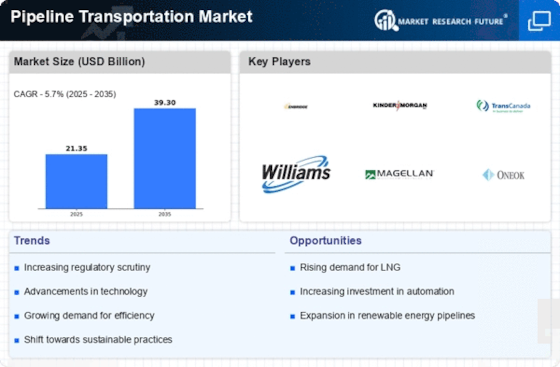Top Industry Leaders in the Pipeline Transportation Market
*Disclaimer: List of key companies in no particular order
Top listed global companies in the Pipeline Transportation industry are:
ABB (Switzerland)
Emerson Electric Co. (U.S.)
ESRI (India)
FMC Technologies (U.S.)
Rockwell Automation, Inc. (U.S.)
Schneider Electric (France)
Siemens (Germany)
Trimble Navigation Limited (U.S.)
IDS GmbH (Germany)
Baker Hughes (U.S.)
Halliburton (U.S.)
National Oilwell Varco (U.S.)
John Wood Group PLC (U.K.)
Bridging the Gap by Exploring the Competitive Landscape of the Pipeline Transportation Top Players
The global pipeline transportation market is projected to experience steady growth in the coming years, driven by factors like rising energy demand, infrastructure development, and increasing reliance on efficient transportation solutions. However, within this promising landscape lies a dynamic and complex competitive environment. Understanding the strategies of key players, emerging trends, and market share determinants is crucial for navigating this terrain.
Key Player Strategies:
- Consolidation and Acquisitions: Established players like TransCanada, Enbridge, and Gazprom are actively pursuing mergers and acquisitions (M&A) to expand their geographical reach, diversify their portfolio, and gain operational efficiencies. This consolidation trend fosters stronger bargaining power and access to larger infrastructure projects.
- Technological Innovation: The industry is witnessing a surge in technology adoption, with players investing in automation, advanced leak detection systems, and pipeline monitoring technologies. This focus on automation aims to boost operational efficiency, minimize downtime, and enhance safety.
- Sustainability Focus: With increasing environmental concerns, pipeline companies are embracing green initiatives. Some are actively collaborating with renewable energy producers to transport hydrogen and biofuels, while others are exploring carbon capture and storage solutions using existing pipeline infrastructure.
Market Share Analysis:
- Geographical Distribution: Market share is heavily influenced by regional dynamics. North America and Europe currently hold significant shares, driven by mature infrastructure and high demand for energy resources. However, the fastest growth is expected in Asia Pacific, fueled by rapid economic expansion and infrastructure development efforts.
- Product Specialization: Pipelines cater to varied products, including oil, gas, refined products, and chemicals. Companies specializing in specific segments, like Transocean with marine oil pipelines or Kinder Morgan with natural gas pipelines, often command stronger market positions within their chosen niche.
- Government Regulations: Regulatory frameworks significantly impact market structure. Stringent environmental regulations and permitting processes can create entry barriers for new players and favor established companies with experience navigating compliance requirements.
Emerging Trends:
- Digitalization and Data Analytics: The integration of artificial intelligence, machine learning, and big data analysis is transforming pipeline operations. These technologies enable predictive maintenance, optimize energy consumption, and enhance risk management capabilities.
- Collaboration and Partnerships: Recognizing the complexities of mega-projects, companies are increasingly forming strategic partnerships with technology providers, engineering firms, and other industry stakeholders. This collaborative approach facilitates knowledge sharing, risk mitigation, and access to expertise.
- Focus on Alternative Fuels: With the growing emphasis on energy transition, pipelines are adapting to transport low-carbon fuels like hydrogen and ammonia. This trend presents both challenges and opportunities as companies invest in retrofitting existing infrastructure and developing new transportation solutions.
Competitive Scenario:
The pipeline transportation market is characterized by moderate competition with a mix of established players, regional operators, and niche specialists. While M&A activity is consolidating the market, new entrants still find opportunities in specific segments or geographically unexplored regions. Overall, the competitive landscape is dynamic and evolving, requiring players to adopt innovative strategies, embrace technological advancements, and adapt to a changing energy landscape to secure a sustainable market share.
In conclusion, the pipeline transportation market offers promising growth prospects, but success hinges on navigating a complex competitive landscape. Understanding key player strategies, market share determinants, and emerging trends is essential for companies to optimize their operations, secure profitable market positions, and contribute to the sustainable development of this vital infrastructure sector.
Latest Company Updates:
ABB (Switzerland):
- Dec 15, 2023: Announced a partnership with Enbridge Gas Distribution to upgrade their pipeline network in Ontario, Canada, with advanced automation and communication technologies. (Source:
Emerson Electric Co. (U.S.):
- Jan 10, 2024: Showcased its latest pipeline automation technologies at the Abu Dhabi International Petroleum Exhibition & Conference (ADIPEC). (Source: Emerson press release)
ESRI (India):
- Jan 12, 2024: Collaborated with Indian Oil Corporation Ltd. (IOCL) to develop a GIS-based pipeline information management system for efficient pipeline monitoring and management. (Source: ESRI website)
FMC Technologies (U.S.):
- Jan 05, 2024: Announced a new subsea pipeline connector technology designed to improve installation efficiency and reduce costs. (Source: FMC Technologies press release)
Rockwell Automation, Inc. (U.S.):
- Jan 16, 2024: Partnered with Chevron to implement its PlantPAx distributed control system for a new pipeline project in the United States. (Source: Rockwell Automation website)










